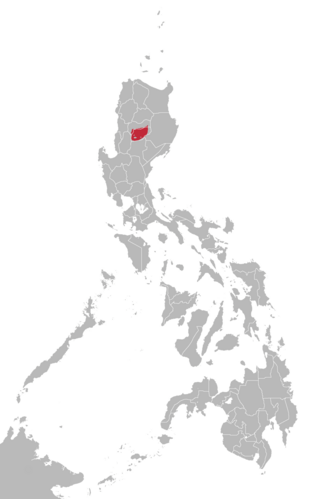Ifugao language
Appearance
(Redirected from ISO 639:ifb)
| Ifugao | |
|---|---|
| Native to | Philippines |
| Region | Ifugao, Luzon |
Native speakers | (130,000 cited 1987–2007)[1] |
Austronesian
| |
| Language codes | |
| ISO 639-3 | Variously:ifb – Batad Ifugaoifa – Amganad Ifugaoifu – Mayoyao Ifugaoifk – Tuwali language |
| Glottolog | ifug1247 |
 Area where the Ifugao dialect continuum is spoken according to Ethnologue | |
Ifugao or Batad is a Malayo-Polynesian language spoken in the northern valleys of Ifugao, Philippines. It is a member of the Northern Luzon subfamily and is closely related to the Bontoc and Kankanaey languages.[2] It is a dialect continuum, and its four main varieties—such as Tuwali—are sometimes considered separate languages.[3]
Loanwords from other languages, such as Ilokano, are replacing some older terminology.[4]
Dialects
[edit]Ethnologue reports the following locations for each of the four Ifugao languages.
- Amganad Ifugao: spoken in Hungduan and Banaue municipalities of Ifugao Province, and into southwestern Mountain Province. 27,100 speakers as of 2000. Dialects are Burnay Ifugao and Banaue Ifugao.
- Batad Ifugao (Ayangan Ifugao): spoken in central Ifugao Province. There are also some speakers in Isabela Province, on the eastern shore of the Magat reservoir. 10,100 speakers as of 2002. Dialects include Ducligan Ifugao.
- Mayoyao Ifugao (Mayaoyaw): spoken in Ifugao Province, (northern Mayoyao, Aguinaldo, and Alfonso Lista municipalities) and Mountain Province (2 small border areas). 30,000 speakers as of 2007.
- Tuwali Ifugao (Gilipanes, Ifugaw, Kiangan Ifugao, Quiangan, Tuwali): spoken in southern Ifugao Province. 30,000 speakers as of 2000. Dialects are Hapao Ifugao, Hungduan Ifugao, and Lagawe Ifugao.
Phonology
[edit]Consonants
[edit]| Labial | Alveolar | Palatal | Velar | Glottal | ||
|---|---|---|---|---|---|---|
| Plosive | voiceless | p | t | k | ʔ | |
| voiced | b | d | ɡ | |||
| Nasal | m | n | ŋ | |||
| Fricative | h | |||||
| Lateral | l | |||||
| Approximant | w | j | ||||
- Other sounds such as /s/ and /r/ occur in loanwords.
Vowels
[edit]| Front | Central | Back | |
|---|---|---|---|
| Close | i | ʊ ~ u | |
| Mid | ɛ | ə | ɔ |
| Open | a |
- /ʊ/ can also be heard as close-back [u].
- /ə/ does not exist in the Tuwali dialect.[5]
- /i/ can also be heard as [ɪ].[6]
Orthography
[edit]The unified Ifugao alphabet is as follows: A, B, D, E, G, H, I, K, L, M, N, Ng, O, P, T, U, W, Y. The letters are pronounced differently depending on the dialect of the speaker.[7]
References
[edit]- ^ Batad Ifugao at Ethnologue (18th ed., 2015) (subscription required)
Amganad Ifugao at Ethnologue (18th ed., 2015) (subscription required)
Mayoyao Ifugao at Ethnologue (18th ed., 2015) (subscription required)
Tuwali language at Ethnologue (18th ed., 2015) (subscription required) - ^ (Lebar, 1975: 78)
- ^ (Newell and Poligon, 1993)
- ^ Kinnud, Richard (2013-08-21). "Language Change in the Cordillera". Sun.Star. Baguio. Archived from the original on 2020-01-23. Retrieved 2013-08-30.
- ^ Taleon, Kristine (2020). A Phonological Sketch of Tuwali Ifugao. University of the Philippines Diliman.
- ^ Newell, Leonard E.; Poligon, Francis (1993). Batad Ifugao dictionary, with ethnographic notes. Manila: Linguistic Society of the Philippines. pp. 3–10.
- ^ Hay Mahun an Bahaon, A Pre-Primer in Ayangan Ifugao. Summer Institute of Linguistics, 1984.
External links
[edit]- Kinnud, Richard (2013-08-21). "Language Change in the Cordillera". Sun.Star. Baguio. Archived from the original on 2020-01-23. Retrieved 2013-08-30.
